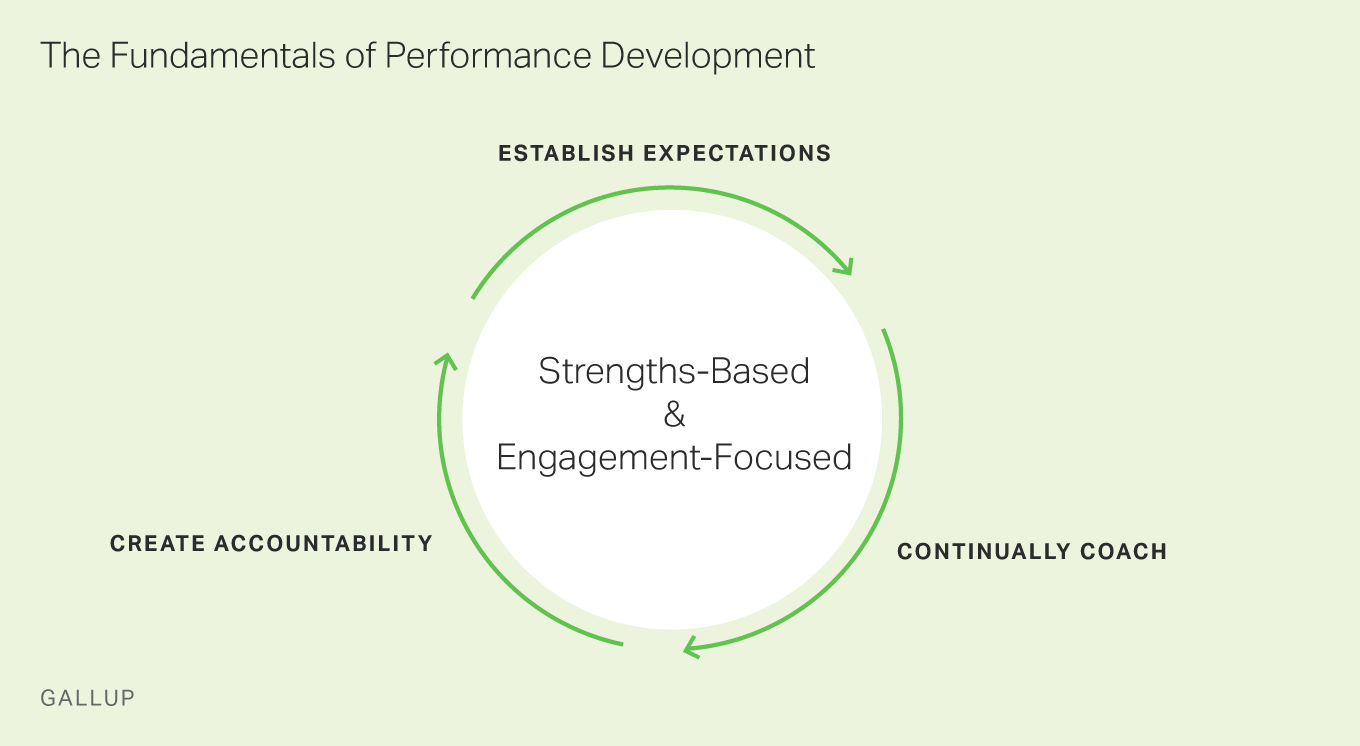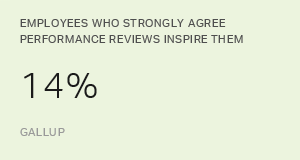Forget for a moment the statement, "Performance management is broken." Equal parts fatalistic and fashionable, that phrase seems to imply that a fix is the next inevitable step.
But you know that's not the case -- not when the underlying causes of flawed performance management strategies are so chronic.
You can feel these seismic shifts in the global workforce -- generational forces, technological changes, remote-working trends, matrixed team makeup, etc. -- close to home in your own organization. They're the types of disruptive developments that leave leaders still tethered to traditional performance management strategies struggling to equip, inspire and improve the performance of their employees and teams.
But because the workforce evolves, so too does your workplace. The key is to determine what this evolution means for your workplace culture. What do your employees want? What do they need?
Gallup research finds that employees want to work for a purpose, not just a paycheck. They work not just because it's their job, but because their career is an integral part of their life.
Employees used to expect to work for a boss. Now, they're looking for a coach. Because they don't just want to be satisfied with their role or their job. Your employees want personal and professional development, immediately and for the future.
But they need help to accomplish any of this.
Unfortunately, Gallup research finds that the shifts in the global workforce have created a significant schism between how organizations manage employee performance and what employees say is imperative to their individual development.
How do we know? We asked. Employees told us what they need from their manager is:
- job clarity and priorities
- ongoing feedback and communication
- opportunities to learn and grow
- accountability
So it is disheartening that:
- 30% of employees strongly agree that their manager involves them in goal setting
- 27% strongly agree the feedback they receive helps them do their work better
- 22% strongly agree their performance is managed in a way that motivates them
- 19% strongly agree that they talked to their manager about steps to reach their goals
And what about the team?
Though efforts to improve performance start with the individual, you must align performance development approaches with team and organizational goals. Doing this will then help you effectively reach and exceed those objectives by boosting the effect of individual development across the workforce.
Why Performance Development Wins in the Workplace
Moving your organization to a culture of performance development is not easy.
Gallup's studies of high-performing teams prove that effective performance development efforts require managers' unwavering commitment to a strengths-based, engagement-focused approach to development.
If your managers understand how their people are innately talented and what they naturally do best at work as well as employees' performance needs and barriers to success, then your managers can consistently lead their teams to high performance.

Start Leading High-Performance Teams Today.
Learn how Gallup's new management development course can help you get the most out of your employees and teams.
No longer the outmoded boss, your strengths-based, engagement-focused managers can become the coaches who create real, meaningful change for individuals, their teams and the entire organization.
These managers can create cultural change by using an approach that's simple but profound, if only because the best managers Gallup studied use it to lead their teams to greater performance.
A performance development approach works because it effectively establishes expectations.
Don Clifton once wrote, "Nothing happens until someone expects something of you in ways you can achieve."
It's alarming, then, that Gallup's research finds only one in two employees clearly know what is expected of them when they go to work every day.
When managers can establish expectations the right way -- expectations that are clear, collaborative and aligned -- they create trusted relationships with their employees and properly align them with their roles.
With these foundational elements in place, manager and employee can agree to performance metrics that matter to the individual's interests and to the goals of the larger team and organization as a whole.
A performance development approach works because it gives employees continual coaching.
Traditional performance management puts off until tomorrow what can benefit employees and the team today.
Only one in five employees strongly agree that they have talked to their manager in the past six months about steps to reach their goals. Similarly small percentages strongly agree that their manager provides meaningful feedback and that the feedback they receive helps them do better work.
Those last two findings are a nasty sort of managerial malpractice, considering that employees who strongly agree with these statements are 3.5 and 2.9 times more likely to be engaged, respectively.
When managers move from intermittent reviews to providing frequent, focused and future-oriented feedback, they address current performance successes and opportunities while continuing to forge authentic, development-focused relationships that pay dividends down the road for individuals, the team and the organization.
A performance development approach works because it creates individualized accountability.
The authors of the paper Re-Engineering Performance Management wrote it best:
"Astonishingly, less than one-half of employees surveyed by Gallup (40%) strongly agree that their manager holds them accountable for their performance goals."
Perhaps as predictable as that statement is shocking to those experts, employees who strongly agree with it are 2.5 times more likely to be engaged in their work.
Performance development efforts essentially begin and end with holding both employee and manager accountable. All of the other efforts, strategies and actions matter only if you hold both parties responsible.
The best performance reviews are achievement-oriented, fair and accurate, and developmental. Managers who give these types of reviews inspire individuals who receive them to be their best. What more effective way is there to lead employees and their teams to high performance?

Forget the Quick Fix; Focus on Developing Your People
If one thing is certain, workplace challenges will evolve. There will always be something else, foreign and flummoxing and testing your ability to get the best from your employees and teams.
Workplaces that will win in the near and long term don't cut corners. Winning workplaces reimagine traditional team leaders as performance coaches. They require those coaches to account for their own strengths, their employees' and the collective strengths of their teams. And these workplaces demand coaches lead by focusing on the basic, individual, teamwork and growth needs of an engaged workplace.
Armed with managers empowered to truly coach and develop their teams, successful workplaces use a performance development approach to transform their culture into one in which each individual and team can engage in their roles and aim their efforts to accomplish the organization's goals.
Again, this isn't easy, but it's worth it -- worth it for your employees, teams, leaders and organization's future.
Gallup can help you transform your workplace through performance development:
- Download our Leading High-Performance Teams course overview to learn how your managers can equip, inspire and improve employee and team performance
- Watch our webinar on making performance reviews more effective for your employees
- Download our position paper Re-Engineering Performance Management


